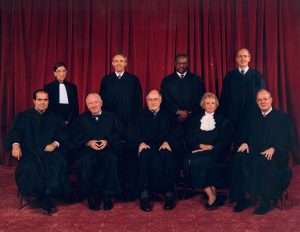The Volokh Conspiracy
Mostly law professors | Sometimes contrarian | Often libertarian | Always independent
Today in Supreme Court History: January 25, 1819
1/25/1819: Thomas Jefferson charters the University of Virginia. 176 years later, the Supreme Court would decide Rosenberger v. Rector and Visitors of the University of Virginia (1995).

Editor's Note: We invite comments and request that they be civil and on-topic. We do not moderate or assume any responsibility for comments, which are owned by the readers who post them. Comments do not represent the views of Reason.com or Reason Foundation. We reserve the right to delete any comment for any reason at any time. Comments may only be edited within 5 minutes of posting. Report abuses.
Please to post comments


Montgomery v. Louisiana, 577 U.S. 190 (decided January 25, 2016): Miller v. Alabama, 2012, declaring that life without parole for juvenile offenders is “cruel and unusual punishment”, is to be applied retroactively
Richardson v. Lawrence County, 154 U.S. 536 (decided January 25, 1864): holder of bonds could recover par value even though railroad sold them at 64 cents on the dollar, where county had authorized railroad to sell them only at par
Menominee Indian Tribe of Wisconsin v. United States, 577 U.S. 250 (decided January 25, 2016): no equitable tolling of statute of limitations for tribe suing on claim that federal government breached contract by failing to pay support costs for Indian-run health service; tribe mistakenly believed that there was a toll until a related class action was decertified (the law on that issue is muddled — they should have been “better safe than sorry”)
Spectrum Sports, Inc. v. McQuillan, 506 U.S. 447 (decided January 25, 1993): no “attempted monopolization” (§2 of the Sherman Act) where there was no “dangerous probability of success” (this had to do with a new shock-absorbing polymer used in athletic products; manufacturer’s switch to new distributor put old distributors out of business) (“The purpose of the Sherman Act is not to protect businesses from the working of the market; it is to protect the public from the failure of the market”)
Virginia v. American Booksellers Ass’n, 484 U.S. 383 (decided January 25, 1988): certifies question to Virginia Supreme Court as to applicability of new Virginia statute criminalizing display of sexually explicit materials where juveniles could see it insofar as it would apply to juveniles of different ages (Virginia court answered that books in question were not “sexually explicit” as defined in the statute, 236 Va. 168) (books included “Ulysses” and “The Witches of Eastwick”)
The dissent arguments in Montgomery lead to vile outcomes. That should have been enough to persuade Scalia and Thomas that their position was wrong as a matter of justice, but sometimes they can't resist getting in touch with their inner Freisler.
I think at least one of Rosenberger and Hastings College of Law was wrong. I am starting to think both were.
I think Hastings Law was wrong because subsidizing only religious groups that have government-approved membership policies violates the Establishment Clause. I think religious groups get the same internal-affairs control over who their members are as who their leaders are and what their doctrines are. When government conditions a subsidy on a religious group accepting the government’s idea of who/what the religious group’s leaders, members, or doctrines should be, it is establishing religion plain and simple.
And I am becoming inclined to think government should have the choice of either not subsidizing any religious groups if it finds some religious groups’ leaders, doctrines, or membership policies abhorrent, or subsidizing them all and not getting to choose among them or impose strings that affect core religious internal-affairs autonomy. When courts say the state MUST subsidize religious groups, and then say subsidies of religious groups permit the state to control the groups’ leaders, doctrines, and/or members, they are not merely blessing wholesale violation of the Establishment Clause. They are practically mandating it.